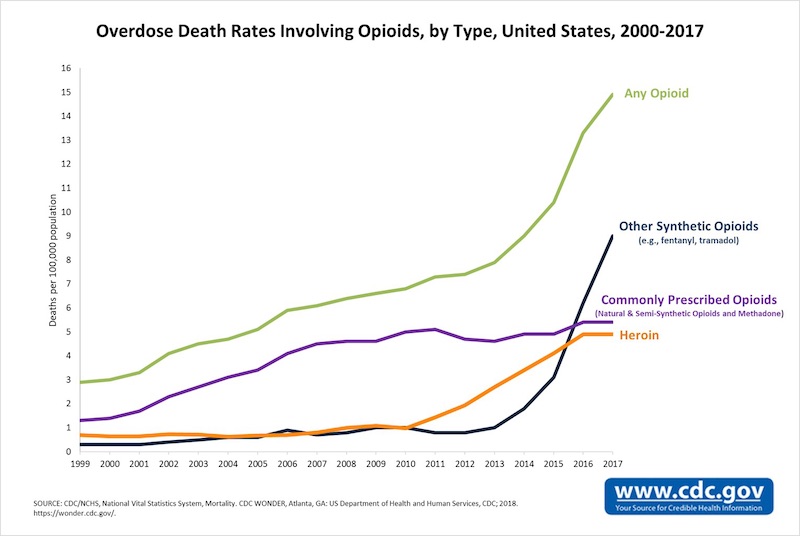How families can address opioid use and recovery
The opioid epidemic continues to ravage communities and devastate families across the United States. Opioid use is a crisis that has received a great deal of attention in recent years, as many American families have been forced to confront the problem head-on. If you have a loved one who is struggling with an opioid use disorder, what can you do to help?
For starters, understand the numbers.
Opioid use by the numbers
According to the Centers for Disease Control and Prevention, more than 130 Americans die each day from an opioid overdose. The U.S. Department of Health and Human Services estimates that between 2016 and 2017, over 11 million people misused opioids, two million of whom did so for the first time. Although this epidemic affects people in all parts of the country, factors such as a history of substance use, mental health disorders, adverse childhood experiences, and living in a rural area or in poverty have been shown to increase the risk of developing an opioid use disorder.
Opioid overdose deaths in the United States is a multi-layered problem that has developed over several decades. The 1990s saw a significant rise in prescription opioid overdose deaths, followed by a rise in heroin overdoses in 2010, and an increase in deaths caused by synthetic opioids, such as fentanyl, beginning in 2013.
Source: https://www.cdc.gov/drugoverdose/data/analysis.html
While it's easy to feel overwhelmed when you look at the scope and scale of the opioid crisis, there are things every person can do to help stem the tide of the opioid epidemic. Within your own community, consider thoughtfully how you talk about the issue.
The words we use make a difference
When it comes to helping people with substance use disorders, the language we use is crucial to supporting those in treatment and recovery, as well as reducing stigma. An opioid use disorder is not a moral failing, but rather a disease much like diabetes or cancer. It’s thus important that we talk in clinical and supportive ways to help reinforce this message. We also can be sure we’re using the right terminology. For instance:
- Say prescription opioids or prescription opioid pain medications instead of painkillers.
- Say substance use disorder or opioid use disorder instead of drug addiction or drug habit.
- Say person with a substance use disorder or person who uses drugs instead of abuser/user, addicts, junkies, perpetrators, or criminals.
The impact of substance use disorders on families
We know that substance use disorders not only impact those struggling with the disease, but also their families – spouses, siblings, parents, and children. For example, substance use disorders can negatively affect a parent’s ability to provide a stable, nurturing home and environment. In fact, most children involved in the child welfare system and placed in out-of-home care have a parent with a substance use disorder. Furthermore, families affected by parental substance use disorders have a lower likelihood of successful reunification with their children, and their children tend to stay in the foster care system longer than children of parents without substance use disorders.
Treating substance use disorders: A family-focused alternative model
For parents struggling with a substance use disorder, an individual treatment program is the traditional model. However, a parent-only recovery program (i.e., a program that does not involve their family) may dampen a parent’s ability to establish a healthy relationship with their children and expose their family to additional trauma.
An alternative model is proving successful in strengthening families. Family-focused treatment programs are shown to not only increase recovery from substance use disorders and encourage retention in treatment, but they also boost parenting skills and capacity and enhance child well-being. By including family members in the recovery process, these programs foster a sense of understanding, reduce isolation and stigma, and provide people with a safe space to express emotions and discuss their experiences.
Family-focused treatment programs may be run out of medical facilities, nonprofits, or family treatment courts. In all cases, they share the goals of providing holistic support to family members, increasing reunification, and preventing future drug use.
A treatment program built on the premise of including families—and leveraging the love they have for the person in treatment—requires coordinated efforts among everyone involved in the recovery process. To introduce best practices and family-focused strategies, the National Resource Center for Healthy Marriage and Families hosted a webinar on family-focused strategies for addressing opioid use disorders. The webinar features ICF experts Christina Zurla and Robyn Cenizal, as well as leaders from Children and Family Futures and Shatterproof, two organizations dedicated to family-focused treatment. Check out the webinar.

